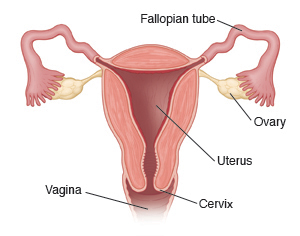Dysfunctional uterine bleeding is also called abnormal uterine bleeding. It's a condition in which bleeding is abnormal and occurs at unexpected times of the month. This happens because of changes in the hormones that help control a person's menstrual cycle each month.
The bleeding may be heavier or lighter than normal. If you often have heavy bleeding, this can lead to a problem called anemia. With anemia, your red blood cell count is too low. Red blood cells help carry oxygen throughout your body. Severe anemia may cause you to look pale and feel very weak or tired. You might also become short of breath easily.
To treat dysfunctional uterine bleeding, you may take medicines. If these don’t help, or if you have other symptoms or have reached menopause, you may need more testing and other treatments. Discuss all of your options with your healthcare provider.
Home care
Medicines
If you’re prescribed medicines, take them as directed. Some of the more common medicines you may be prescribed include:
-
Hormone therapy, which includes most methods of hormonal birth control such as pills, shots, or a hormone-releasing IUD
-
Nonsteroidal anti-inflammatory drugs (NSAIDs), such as ibuprofen
-
Tranexamic acid to help your blood clot
-
Iron supplements, if you have anemia
General care
-
Get plenty of rest if you tire easily. Don't do strenuous exercise.
-
To help ease pain or cramping that may occur with bleeding, try using a heating pad on the lower belly or back. A warm bath may also help.
Follow-up care
Follow up with your healthcare provider, or as directed.
When to get medical advice
Call your healthcare provider right away if:
-
Bleeding becomes heavy (soaking 1 pad or tampon every hour for 3 hours)
-
Increased abdominal pain
-
Irregular bleeding gets worse or does not get better even with treatment
-
Fever of 100.4ºF (38ºC) or higher, or as directed by your healthcare provider
-
Signs of anemia, such as pale skin, extreme fatigue or weakness, or shortness of breath
-
Dizziness or fainting
Featured in


